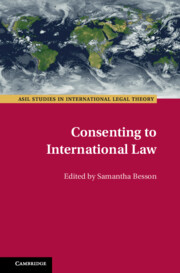Book contents
- Consenting to International Law
- ASIL Studies in International Legal Theory
- Consenting to International Law
- Copyright page
- Contents
- Contributors
- Preface
- Consenting to International Law
- Part I Notions and Roles of Consent
- 1 Consenting Is Not Willing
- 2 State Consent and the Legitimacy of International Law
- 3 Controlling Consent
- 4 International Organizations and the Disaggregation of Consent
- 5 Consenting to International Law in Five Moves
- Part II Objects and Types of Consent
- Part III Subjects and Institutions of Consent
- Index
2 - State Consent and the Legitimacy of International Law
from Part I - Notions and Roles of Consent
Published online by Cambridge University Press: 23 November 2023
- Consenting to International Law
- ASIL Studies in International Legal Theory
- Consenting to International Law
- Copyright page
- Contents
- Contributors
- Preface
- Consenting to International Law
- Part I Notions and Roles of Consent
- 1 Consenting Is Not Willing
- 2 State Consent and the Legitimacy of International Law
- 3 Controlling Consent
- 4 International Organizations and the Disaggregation of Consent
- 5 Consenting to International Law in Five Moves
- Part II Objects and Types of Consent
- Part III Subjects and Institutions of Consent
- Index
Summary
The author argues that while State consent does contribute to international law’s legitimacy, it does not do so by providing a justification for it. States are not bound to obey international law because they have chosen to submit to its authority. Rather, international law provides them with a reason for action, and indeed they have a moral duty to obey it, if and only if they will do better at realizing justice if they act as the law directs them to act than if they act on their own judgment. As a means for crafting international law, State consent is, according to the author, valuable insofar as it yields international legal norms that satisfy this condition. He argues, that in a few cases, it may also constitute an intrinsically valuable expression of trust in the international political community or an international institution that exercises political authority.
Keywords
- Type
- Chapter
- Information
- Consenting to International Law , pp. 49 - 71Publisher: Cambridge University PressPrint publication year: 2023

